Motivated by her own complicated pregnancy, Heidi Breeze-Harris founded One by One, a Seattle-based organization working to wipe out obstetric fistula in Africa.
Welcome to the April 2013 issue of the Global Washington newsletter. If you would like to contact us directly, please email us.
IN THIS ISSUE
Note from our Executive Director
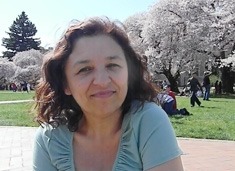
Greetings!
Hope you are enjoying these beautiful spring days. I am looking out of my window at the lovely cherry blossoms, tulips, and daffodils, and I’m feeling so happy that longer days and more sunlight are finally back.
We at GlobalWA have been quite busy in the last month. The collective impact groups are deep in the process of identifying shared goals and metrics and starting to work on these goals. Please take a moment to learn about these groups and consider joining one.
We are also very busy with plenty of great events—do check out our new members only series that supports the capacity building needs of your organizations. We hope you are able to attend and contribute to these conversations with experts in the field of fundraising, communications and social media this month.
In a bid to improve how we describe our members and your impact on the lives of millions worldwide, GlobalWA is working with University of Washington’s Daniel J. Evans School of Public Affairs to conduct a survey of our members. We want to create a positive narrative around the work our members do and really show your impact. In this spirit, we have appealed to all of our members to share the information you might have to craft this narrative. With your input, we hope to have a report to share with civic, business and political leaders by the end of summer.
Thanks so much for supporting GlobalWA. I hope to see you soon at one of our events.
In unity,

Bookda Gheisar, Executive Director
Back to Top
Empowered by chocolate
Oikocredit Northwest invites you to join us for an evening with Kuapa Kokoo, a farmer’s cooperative in Ghana.
While sampling chocolates paired with wine and other beverages, attendees will learn about Kuapa Kokoo, Oikocredit, Divine, and PCC, four partners in the Fair Trade value chain that supplies the cocoa for the Divine chocolate on our supermarket shelves. The program will feature specific stories of Ghanaian farmers in control of their own destiny through innovative ownership structures, and how grassroots-based sustainable economic development is supported by responsible financing from the “global north.”
When: May 9th 6:30 pm – 8:30 pm (Program runs ~ 7:00-7:45pm)
Where: World VIP Lounge, 400 NE 45th Street, Seattle, WA 98105
Back to Top
Take a moment to support education
April 22nd is Global Action Week. Global Action week highlights activities and encourages action throughout the year across the US to address the urgent need of universal quality education.
Global Campaign for Education is asking people around the country to visit the Global Action Week website (http://globalactionweekusa.org) and register to indicate how they are supporting education this year (not just during that week)–a dot will pop up for every action registered (signing a petition, calling member of congress, hosting a film, etc.). Actions can either be by an individual or a group. Please take a moment and show your support for education by registering on the site.
Back to Top
Featured Organization
Literacy Bridge brings Talking Books to rural Ghana
By Sara Veltkamp
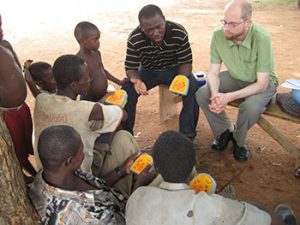
Cliff Schmidt at a Talking Book demonstration in Ghana.
Suglo is a traditional birth attendant and farmer in Ving-Ving, Ghana. Until 2009, she and the others in her rural village farmed the same way their parents and grandparents had taught them, unaware of more productive techniques. They didn’t know to plant their corn, beans and peanuts in neat rows, or even to use manure from their livestock as fertilizer. With nearly 80 percent of adults lacking formal education, Ving-Ving’s farmers were sidelined by illiteracy and unable to get information on improved farming and health practices – until Literacy Bridge helped farmers gain access to knowledge from agriculture experts.
Literacy Bridge, a global nonprofit organization founded in 2007 and based in Seattle, strives to bring crucial knowledge to the poorest villagers in rural Ghana, with limited access to electricity, education and mobile phone networks. Cliff Schmidt, its founder and executive director, believes “education in the broadest sense is the best investment that you can make in people or that people can make in themselves.” His definition recognizes not just the importance of schooling, but also in technology that can provide “the education a farmer can have about increasing his crop yield or a mother can have about keeping her children healthy.”
In looking at other programs working to alleviate African poverty, Schmidt began to question projects where “the math just didn’t make sense,” with relatively high costs per client. His initial research in Ghana also convinced him that programs should be designed from the ground up, at the lowest cost possible. Furthermore, he discovered that while his original focus area of improving literacy was important, the immediate demand was for something even more specific: affordable and easy-to-use technology for accessing knowledge.
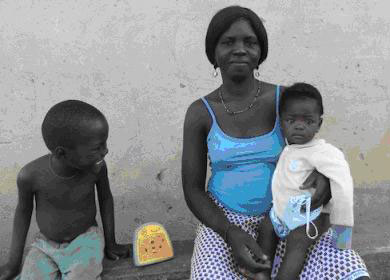
A Ghanaian family with their Talking Book.
“Over and over, I kept hearing these health and agriculture experts say, ‘why can’t we just record our advice and knowledge on a device and leave it in these villages?’” he recalled.
In 2009, Literacy Bridge launched the pilot project for its Talking Book, a cheap, durable and easy-to-use audio computer. This hand-held mobile device, which costs just $25, equips illiterate people in remote, rural areas with the information needed to improve their health and welfare through recorded audio messages. The pilot study, including farmers like Suglo in Ving-Ving, was a huge success, and the program has grown to 10 villages.
Expanding Goals
After its initial success with the Talking Book, Literacy Bridge has entered a period of transition. The organization would like to extend its reach beyond Ghana, to other parts of the developing world. However, Literacy Bridge has learned that it’s not effective to simply distribute new technology if the recipient organizations don’t have the capacity – time, language, content development, community advisors – to effectively use it. Instead, through further development of their work in Ghana, Schmidt and his staff want to create a replicable system of support necessary to continually update the Talking Book’s content with information relevant to different communities.
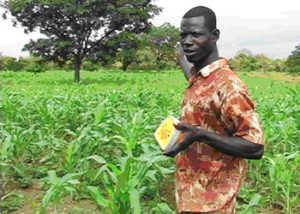
Ghanaian farmers get information from the Talking Book to improve their crop yield.
“The Talking Book device is an important component to our work [but] there are many other aspects that need to be done well for the program to be effective,” said Bridgette Greenhaw, Literacy Bridge’s program director. “For example, we have found that it is critical to hire a part-time Community Agent in each of the rural communities in which we work. This helps to better facilitate the program, as well as provide community-level expertise in what works and what doesn’t in individual communities.”
For 2013, the organization is focusing on providing an end-to-end service for the world’s poorest, while continuing to use the Talking Book as its primary tool. By sharing knowledge on the key issues of agriculture and health, the organization plans in the coming years to scale up its programming and staff in Ghana and the United States, currently at around 20 employees, along with a support network of graduate level interns, research assistants and professional volunteers.
In the meantime, villages like Suglo’s have been transformed. Talking Book users have won awards for their peanut and bean yields from Ghana’s Ministry of Food and Agriculture. With the information now available to pregnant women and their families on the device, more Talking Book users are leaving behind their traditional but dangerous birthing practices in favor of safer health-care facilities where trained medical professionals can manage complications and care for mothers and babies during and after labor.
By bringing new technology and community experts together, Literacy Bridge is making a lasting difference in the lives of Ghana’s rural poor, with promising possibilities for the poorest of the poor worldwide. For more information or ways to contribute, visit http://www.literacybridge.org.
Back to Top
Changemaker
Paula Clapp: From giving globally to acting locally
By Megan Boucher
“One person of integrity can make a difference, a difference of life and death. As long as one dissident is in prison, our freedom will not be true. As long as one child is hungry, our life will be filled with anguish and shame. What all these victims need above all is to know that they are not alone; that we are not forgetting them, that when their voices are stifled we shall lend them ours, while their freedom depends on ours, the quality of our freedom depends on theirs.” ~Elie Wiesel (Night)
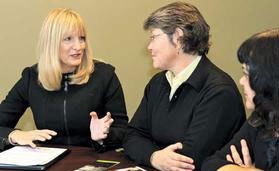 Paula Clapp’s favorite quote, by Holocaust survivor and celebrated author Wiesel, sums up what she has always considered her life’s purpose: “Giving a voice to those who do not have a voice and helping people who are unseen to be seen.” This mission permeates her prolific career of philanthropy, service and volunteerism – starting with her candy striper days at Children’s Hospital and continuing to her latest project, StolenYouth, which focuses on creating awareness and providing support for sexually exploited youth.
Paula Clapp’s favorite quote, by Holocaust survivor and celebrated author Wiesel, sums up what she has always considered her life’s purpose: “Giving a voice to those who do not have a voice and helping people who are unseen to be seen.” This mission permeates her prolific career of philanthropy, service and volunteerism – starting with her candy striper days at Children’s Hospital and continuing to her latest project, StolenYouth, which focuses on creating awareness and providing support for sexually exploited youth.
Paula has a master’s degree in counseling and earlier in her career, worked as a middle school counselor for Zion Preparatory Academy. Over the years, she and her husband Bill have become integral to Seattle’s international philanthropic and development community, including founding the nonprofit impact investor Global Partnerships in 1994. “The borrowers are my heroes and heroines,” Paula said, of the small business owners who receive loans or other financial services through Global Partnerships in order to improve their lives.
In 2006, the Clapps co-founded the Seattle International Foundation, which focuses on global poverty alleviation through grantmaking and supporting the greater Seattle area’s international philanthropic community. In addition to her role on the board for Global Partnerships and SIF, Paula has also served on the boards for the Make A Wish Foundation, OneWorld Now!, and the Medina Foundation, and was a founding member of the Washington Women’s Foundation.
“It is an honor to serve,” Paula said, of her longtime devotion to causes that benefit the world’s most vulnerable people.
Almost two years ago, she was given yet another opportunity to serve when she was approached by friends to invest in “Sold,” a film about a young Indian girl sold into prostitution, based on the novel by Patricia McCormick and produced by Emma Thompson. Moved by the film’s subject, Paula and her nine co-investors began learning more about underage prostitution “in our own backyard.” They decided to found StolenYouth, a nonprofit that supports existing programs within organizations working to fight child sex trafficking. For their first project, they have partnered with YouthCare’s Bridge Program, a residential housing program serving sexually exploited girls aged 13 to 17. StolenYouth hosted its first annual “Not
On Our Watch” luncheon on April 17, convening more than 700 people at the Seattle Sheraton to raise money for the Bridge Program’s housing, counseling, job training and high school completion efforts.
Fundraising is important, but raising awareness is also a crucial part of this work – particularly among Americans who think that trafficking is only an international issue, Paula said. YouthCare estimates that in Seattle there are 300 to 500 child prostitutes. “If a child runs away and goes to Westlake Mall or the bus depot, he or she will be approached by a pimp within an hour,” Paula said, citing a YouthCare statistic.
Paula also emphasizes the importance of changing local attitudes towards prostitution, beyond the focus on arresting prostitutes, who are often themselves victims. An important shift is happening that moves away from addressing this issue through the criminal justice system and instead seeks to provide needed services for the child’s rescue and recovery.
StolenYouth’s board hopes for their work and film to be used as educational tools, from middle school classrooms to college campuses.
“And we want to get more men involved!” Paula exclaimed. “Because this is really a systemic issue that affects us all. It starts with our home life, our attitude about women and girls, and how girls are portrayed in the media.”
Both men and women need to be more aware of the subtle and explicit ways women are objectified in our culture, she added – attitudes that contribute to the problem of trafficking.
“It’s a consciousness shift,” Paula explained, adding that she is encouraged by what she has seen so far. As she talks to people about StolenYouth, the response has been overwhelmingly positive.
“What I see is the kindness of people,” she concluded. “People wanting to help, wanting to volunteer. That is really a beautiful thing.”
Back to Top
Welcome new members
Please welcome our newest Global Washington members. Take a moment to familiarize yourself with their work and consider opportunities for support and collaboration!
Construction for Change: We partner with rural communities to build schools, medical facilities and other critical infrastructure where it is needed most. By providing infrastructure, we empower local non-profit organizations to create opportunity and break the cycle of poverty in their communities. http://constructionforchange.org/
Ecofiltro: One: We deliver filters to rural communities in a sustained manner that creates clean water for life. http://www.ecofiltro.org/en
MED25 International: Med25 International is a nonprofit organization that provides individuals in rural African communities with quality, culturally appropriate, and affordable health care. http://www.med25.org/
Partners Asia: At Partners Asia, we build relationships with innovative organizers in these communities and with international donors, bridging the gap between local leaders and global resources. http://partnersasia.org/
Planned Parenthood of the Great Northwest: Planned Parenthood of the Great Northwest (PPGNW) is a not-for-profit family planning agency that provides high-quality, affordable reproductive health care for women, men and teens. Many of our patients have no other health care available to them. http://www.plannedparenthood.org/ppgnw/
Back to Top
Global Washington Announcements
Video production workshop for nonprofits this June
A special opportunity for GlobalWA members – limited space available so act fast!
This course at 4Culture in Pioneer Square will guide you through every step of planning, filming, editing and distributing digital video for advocacy and fundraising. Registration is $200, and includes three 4-hour classes, materials, one-on-one tutoring and a public screening of the video you’ll create with our assistance.
The workshop is presented by ChangeStream Media, a Global Washington member that helps nonprofits get their message out through compelling digital content. Last fall, all 12 workshop participants – including the World Affairs Council and Washington Trails Association – completed videos and screened them at the Northwest Film Forum. This is a great opportunity for professional development, gaining exposure for your cause and networking with other activists.
Space is limited to 14 attendees so everyone receives individual assistance using the software and hardware you already own. For details visit changestreammedia.org/workshops.
Global Washington partners with new Seattle Ambassador initiative
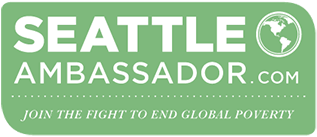 Global WA is pleased to be a partner of the Seattle Ambassador program, a new initiative of the City of Seattle and the Seattle International Foundation (SIF) to inspire and mobilize local residents to join Seattle’s fight against global poverty. This city-wide campaign will raise awareness about local institutions working to alleviate poverty around the world and ask individuals to lend their support to our community’s vibrant global development sector. View a message from Mayor Mike McGinn about this initiative.
Global WA is pleased to be a partner of the Seattle Ambassador program, a new initiative of the City of Seattle and the Seattle International Foundation (SIF) to inspire and mobilize local residents to join Seattle’s fight against global poverty. This city-wide campaign will raise awareness about local institutions working to alleviate poverty around the world and ask individuals to lend their support to our community’s vibrant global development sector. View a message from Mayor Mike McGinn about this initiative.
Residents can text SEATTLE to 80088 or visit seattleambassador.com to join Seattle Ambassador, receive updates about the work of these organizations and learn about events and opportunities to get involved. All eligible participants will be entered for a chance to win an all-expense paid trip to see firsthand how our community is improving lives in Africa, Asia or Latin America.
Please share this opportunity with your networks. For more information, visit www.seattleambassador.com
GlobalWA is looking to interview civic, political & business leaders whose lives have been impacted by Global Education
In conjunction with our efforts to raise awareness about the importance of global education in Washington State, GlobalWA is seeking to interview civic and business leaders whose lives have been impacted by global education. How has a global education shaped you as a person, prepared you to inhabit the world as a knowledgeable global citizen, a competent global leader, and as a supporter of positive corporate, community, and social innovation around the globe? We invite leaders in Washington State to share global education’s influence on their life and career. Contact us at info@globalwa.org.
Back to Top
Announcements
Seattle International Foundation Announces Call for Applications Under it’s 2013 Global Program
The Seattle International Foundation (SIF) is now accepting applications under its 2013 Global Program until May 5th, 2013. The Global Program (small grants for local organziations) supports and fosters local organizations working internationally. SIF is interest in development projects in all regions of the world.
The Global Program is open to 501(c)3 organizations, or those with fiscal sponsorship, with an annual organziational or project budget of less thatn $2 million (USD). Preference will be given to organziations baded in the greater Puget Sound region; organizations based outside of Washington State are not eligible. The Program seeks to support organziations launching new projects, or working to establish or expand an international project or program.
For more information on how to apply, pelase visit: www.seaif.org, or contact Michele Frix, Director of Programs at mfrix@seaif.org.
CityClub Launches Youth Civic Education Initiative and Awards Program
CityClub is shining a spotlight on great youth civic education programs in Washington State through its Youth Civic Education Awards program. Nominations open April 1 and close June 24. Online applications are available at http://www.seattlecityclub.org/youthawards.
Who can apply?
Any project or program for middle and/or high school-aged students that:
- Teaches civic knowledge like democratic decision-making
- Helps youth learn civic skills like listening, collaborating or public speaking, or civic values like support for the common good and the importance of participating in the political process
- Provides youth with hands-on civic experience to practice participation and
community-building
Eligible programs or projects could be student debate teams, service learning opportunities, media literacy projects, mock courts, or other programs that mentor youth to understand how to use their voices, hearts and hands to better themselves and their communities.
The five winners from Washington State will be selected as the Colleen Willoughby Youth Civic Education Award winners, and will be:
- Honored among peers and community leaders;
- Celebrated at an awards ceremony in early fall aired on TVW;
- Highlighted on CityClub’s website;
- Receive a cash prize of $500 for their program.
To learn more about the Youth Civic Education Initiative and Awards program, and see the 2012 winners, visit http://www.seattlecityclub.org/youthawards.
GDC13: Navigating New Choices
Join us for the 4th annual Pacific Northwest Global Donors Conference on Friday, May 17, 2013. This half-day conference will explore new models of social enterprise and new methods of engagement and action. We will feature timely and provacative idea summaries, and provide ample time for participants to talk with each other about the ideas and issues most relavant and resonant to their philanthropic activities. View the agenda!
Date
Friday, May 17
11am – 6pm
Reception to follow
Location
NW African American Museum
2300 S. Massachusetts St.
Seattle, WA 98144
For more information, visit our website at: www.globaldonorsconference.org
New technologies for sustainable development
NBIS introduces some of the Northwest’s Clean Tech and Bio Tech companies, projects, and inventors whose products are designed to address global sustainability challenges and opportunities. The program combines a showcase of companies with a symposium that will address the gaps between early stage investment and the business strategies, market intelligence, and funding necessary for mid to long-term execution, including scaling and effectively bringing products to targeted international markets. Symposium participants include: Tim Elliott, Senior Business Officer at PATH, and Zachary Rozga, an international development strategy expert.
Date
May 20th; 5:00 – 8:00 PM
Location
Bertha Knight Landes Room
Seattle City Hall – 600 Fourth Avenue
Register
http://newtechshowcase.eventbrite.com
NBIS members: $15
Non-Members: $25
17th Annual Seattle Sister Cities Reception
Sponsored by The Boeing Company
Please join Mayor Mike McGinn, City Council President Sally Clark, and other members of the Seattle City Council.Enjoy international entertainment and cuisine highlighting the cities of: Chongqing (China), Limbe (Cameroon), Perugia (Italy), and Tashkent (Uzbekistan)!
Date
Thursday, May 9, 2013
6:00 – 8:30 pm
Location
Bertha Knight Landes Room, Seattle City Hall
(600 4th Avenue, Seattle)
$25.00 for members of any Sister City Association – $30.00 for non-members
Tickets can be purchased through Brown Paper Tickets either online or by phone.
Online: http://www.brownpapertickets.com/event/313102
24/7 Ticket Hotline: 1-800-838-3006
www.seattlesistercities.org
ED Forum
501 Commons – Leadership Speaker Series
Take a quick break to connect with your fellow executive directors, discuss relevant issues, and gather some knowledge you can put into practice right away. Here are this month’s discussion topics:
- “If only I had known….Lessons for new EDs from Experienced Leaders”
– Rosemary Aragon,Pacific Hospital Preservation and Development Authority Executive Director
- “Broad shoulders: Building and supporting a leadership team”
– Kirk Adams,Lighthouse for the Blind President and CEO
- “The ED’s role in training board members to solicit donations”
– George Frasier, Executive Director of Development, Green River Community College Foundation
- “Up in the cloud: Advantages to cloud computing”
– Nancy Long, 501 Commons Executive Director
Date
501 Commons ED Forum
April 24, 8:30-10:30am
Location
2100 Building, Seattle
Members $18; Non-Members $25
Register
The ED Forum is presented by 501 Commons and co-sponsored by Global Washington. Members of 501 Commons/NPower, Global WA, and Washington Nonprofits are eligible for the member discount price.
World Malaria Day 2013 at PATH
Please join us on Thursday, April 25, to commemorate World Malaria Day 2013 at PATH Headquarters in Seattle, WA. The global theme this year is “Invest in the Future: Defeat Malaria.” Malaria experts based in the Seattle area will participate in a panel discussion addressing the opportunities and threats on the horizon for malaria.
Moderator
- Amie Batson, Chief Strategy Officer, PATH
Discussants
- David Brandling-Bennett, Malaria Program Deputy Director, Bill & Melinda Gates Foundation
- Kent Campbell, Malaria Control Program Director, PATH
- Stefan Kappe, Malaria Program Director, Seattle BioMed
- Carol Sibley, Scientific Director, Worldwide Artemisinin Resistance Network
The event will include a community marketplace, where the Institute for Health Metrics and Evaluation, PATH, Pilgrim Africa, RESULTS, Rotary Malaria Partners, Seattle BioMed, the UW Department of Global Health, the Washington Global Health Alliance, World Vision, Global Washington, Health Alliance International, and the Worldwide Antimalarial Resistance Network will present their latest work in fighting malaria.
Food and beverages will be served.
Date
Thursday, April 25, 2013, 4:30–7:00 p.m.
Register
Directions to PATH and parking instructions are available for download here.
For questions regarding this event please contact Angela Hartley at ahartley@path.org or 206.302.4580.
Songea Soirée: Safari to Success
2013 Dinner & Silent Auction
Benefits orphan care and education for children in Songea, Tanzania.
Keynote: Nashon Kikalao, (By Skype from Tanzania) Songea’s Kids special envoy
$100 per person includes drinks, appetizers, dinner, dessert, museum admission
Date
Thursday, June 6, 2013
7:00-9:00pm
Location
NW African American Museum, Seattle
www.songeaskids.org
Bo M. Karlsson Foundation’s 2013 Mahilaa Social
An auction, dinner, and celebration to help educate and empower women in Nepal
BMFK’s 2013 Mahilaa Social will include a silent auction and wine bar, Nepali dance and music, dinner catered by New India Express, a live auction, and a dessert dash with sweets dreamed up by local chefs. Professional auctioneer Laura Michalek will keep the fundraising moving forward, with help from guest emcee Amanda Westbrooke, co-host of TV Tacoma’s Cityline talk show, and volunteers from the Ingraham High School’s Human Rights Club.
The Mahilaa Social live auction will feature handmade jewelry, art, and objects from Nepal; photography, paintings, and sculpture from Northwest artists; gift certificates for Seattle-area restaurants and activities; and a whole lot more! Pining for an exotic getaway? Be prepared to bid on travel packages to India, Italy, Mexico, Argentina — and a South Africa photo safari.
All funds raised by the event will go directly to scholarships for Nepali women.
Date
Sunday, May 19, from 2:00-5:00 pm
Location
Mount Baker Clubhouse in Southeast Seattle
Mahilaa Social tickets can be purchased through Eventbrite.com at http://bmkf.eventbrite.com/.
For more information about the Mahilaa Social or the Bo M. Karlsson Foundation, email info@bomkarlsson.org or visit www.bomkarlsson.org.
Construction for Change 5th Annual Spring Banquet
Construction for Change will host our 5th Annual Spring Banquet in downtown Seattle on Thursday, May 2nd, 2013. Join us for an evening of great food, local wines and a chance to mingle with other professionals in the construction, finance and development industries.
Construction for Change (CfC) organizes the banquet every spring in an effort to raise awareness about our organization, inspire hope, and gain the support needed to continue our work. CfC is a non-profit construction company that partners with communities worldwide to build schools, medical facilities and other critical infrastructure where it is needed most. This year, we have committed to six projects in the Solomon Islands, Kenya (2), Cambodia, Dominican Republic and Spokane, WA. For more information about CfC, please visit our website.
In addition to dinner and drinks, we have an exciting program lined up – videos from the field, inspiring speakers and a West African drum and dance performance by the Gasango group. We will also unveil our 2013 community gallery with photos from the Solomon Islands by J.Koe Photography. For a donation of $750, you can host a table for you and seven of your friends and colleagues while you enjoy endless food, wine and a memorable experience.
Date
May 2, 2013
Doors open at 6pm, program starts at 7pm
Location
Sodo Park by Herban Feast
To reserve your table, please contact Shelby Port, CfC Executive Director, at Shelby@constructionforchange.org or (206) 953-9699.
The Ultimate Mother’s Day Gift
In honor of Mother’s Day, Days for Girls is launching the Mother May I Campaign. The purpose of the campaign is to empower the next generation of mothers in the world through health and hygiene, while giving participants the chance to share stories of amazing and inspirational women in their own lives. You can make a donation or launch your own fundraising page. Check out our website and video for more information. Thanks for participating, and Happy Mother’s Day! http://www.stayclassy.org/events/mother-may-i-campaign/e24340
The Fiesta de Global Visionaries Auction: Igniting Leadership Through Community
YOU are our community and we want to see you there, celebrating 15 years of developing powerful leadership in our young people.
Whether you are a parent of a participant, an alum, or a friend who loves seeing young people ignited by their roles as global citizens, please come share your support for these amazing youth!
Preview some astonishing live items and buy your tickets today!
Date
Saturday, May 11 at 5:30pm
Location
The Brockey Center at South Seattle Community College
6000 16th Ave. SW
Seattle, WA 98106-1499
Tickets
If you cannot join us this year, and want to show your support for low-income youth and solidarity with GV, May 15 is your chance to GiveBIG!
GiveBIG is a one day, community-wide giving challenge that will boost the impact of all donations through matching funds made possible by The Seattle Foundation, individual donors and other sponsors. Between midnight and midnight on Wednesday, May 15, make an online donation via our page on The Seattle Foundation’s website and amplify your gift!
Host an international Earthcorps Corps member in your home
EarthCorps is now seeking host families or individuals for our international corps members from June – December 2013. Hosts must commit to a minimum of three months.
International corps members are emerging young professionals (ages 22-26) seeking to expand their conservation/environmental skills with practical hands on experience. Corps members are from over 80 countries around the world and are proficient in English. They will be training full-time at EarthCorps.
EarthCorps pays host family a stipend up to $350 monthly to offset food and living expenses. In exchange, host families provide the corps member with their own furnished bedroom and food, as well as help navigating Seattle and understanding customsin the Pacific Northwest. Corps members must be able to reach Magnuson Park by bus within 45 minutes.
Download and complete an application online, or email Su Thieda for more information.
Learn About Educational and Development Projects in Nicaragua and Seattle
Join us on Saturday morning, May 11, when faculty and staff leaders from Jesuit universities in Seattle, WA and Managua, Nicaragua share best practices in their teaching, research and community engagement in relation to poverty.
This free, half-day conference is a joint offering by Seattle University and the Universidad Centroamericana, and is designed for a broad audience from the wider community as well as those on campus. Come learn about how these two Jesuit universities are seeking to make a difference in their respective settings, in partnership with other community organizations, through a range of creative initiatives.
To learn more and to register please visit:
“Jesuit Universities Engaging Poverty: Perspectives from Seattle and Managua”
Women’s Enterprises International Walk for Water 2013
We hope that you will join us in our efforts to raise $30,000 to purchase water tanks for 20 homesteads in rural Kenya. Each of these 20 tanks will be matched with 20 more, funded by the village women’s groups. That’s 40 families that will directly benefit through the Walk for Water!
Please take a few minutes right now to join the cause. The sooner you register, the more time you will have to encourage friends and family to join us in being part of the solution!
This is a family event that is both kid-friendly and dog-friendly! Your journey will lead you through our Celebration Village where you can enjoy the sounds of African music, taste Kenyan snacks, and participate in crafts and activities as you learn more about the mission of WEI and the people impacted by our efforts.
Date
Sunday, May 5th
1:30 pm
Location
Seward Park
$25 per walker ($15 for students)
Announcing the winner of the Roderick B. Mathews Opportunity Fund Competition!
The World Justice Project (WJP) is pleased to announce the twelve winners of the Roderick B. Mathews Opportunity Fund® competition. The competition is designed to identify and incubate practical programs that strengthen the rule of law, and provide seed-grants to individuals, organizations, or networks with the best actionable ideas.
Meet the winning programs.
Back to Top
Career Center
Highlighted Paid Position
Director of Programs, Partnerships, and Research – Committee for Children
Reporting to the executive director, the director of programs, partnerships, and research (PPR) is a member of the three-member Senior Leadership Team. He or she is responsible for providing leadership, direction, and management of the ten-member PPR team, including planning and budgeting, and will oversee the development, revision, and adaptation of quality education and prevention programs for domestic and international use. The person in this position plays a special role in leading the organization’s grant development efforts to support special projects, as well CFC’s advocacy initiatives. More
Highlighted Volunteer Opportunity
International Volunteer Program – Friends of the Orphans
The Friends International Volunteer Program sends qualified individuals, couples and families to support the staff and children living in the homes of Nuestros Pequeños Hermanos in Bolivia, the Dominican Republic, El Salvador, Guatemala, Haiti, Honduras, Mexico, Nicaragua and Peru. More
Highlighted Internship Opportunity
Resident Internship Opportunities – Esperanza International Foundation
Interns have the opportunity to gain hands-on experience in microfinance and development by contributing to a variety of projects. More
For more jobs and resources, visit https://globalwa.org/strengthen/careers-in-development/
Back to Top
GlobalWA Events
April 24
Dr Is In // Developing Your Case & Message (Members Only)
April 25
Dr Is In // Everything you Wanted to Know About Social Media (Members Only)
May 8
Global Social – Latin America
May 10
Dr Is In // Building a Fundraising Plan & Case for Support (Members Only)
May 14
Dr Is In // Motivating Individual Donors: Building a Loyal Base of Supporters (Member Only)
May 22
Dr Is In // Everything you Want to Know About Events & Fundraising (Member Only)
May 29
Dr Is In // Legal Matters Every International Nonprofit Should Be Aware Of (Member Only)
June 12
Global Social – Kenya and East Africa
Back to Top
Upcoming Member Events
April 24
Third anniversary of the Confucius Institute
May 5
Women’s Enterprises International 5th Annual Walk for Water
May 9
Oikocredit Presents ‘Empowered by Chocolate
May 15
Roundtable with Upaya Social Ventures
Back to Top




 Paula Clapp’s favorite quote, by Holocaust survivor and celebrated author Wiesel, sums up what she has always considered her life’s purpose: “Giving a voice to those who do not have a voice and helping people who are unseen to be seen.” This mission permeates her prolific career of philanthropy, service and volunteerism – starting with her candy striper days at Children’s Hospital and continuing to her latest project, StolenYouth, which focuses on creating awareness and providing support for sexually exploited youth.
Paula Clapp’s favorite quote, by Holocaust survivor and celebrated author Wiesel, sums up what she has always considered her life’s purpose: “Giving a voice to those who do not have a voice and helping people who are unseen to be seen.” This mission permeates her prolific career of philanthropy, service and volunteerism – starting with her candy striper days at Children’s Hospital and continuing to her latest project, StolenYouth, which focuses on creating awareness and providing support for sexually exploited youth. Global WA is pleased to be a partner of the Seattle Ambassador program, a new initiative of the City of Seattle and the Seattle International Foundation (SIF) to inspire and mobilize local residents to join Seattle’s fight against global poverty. This city-wide campaign will raise awareness about local institutions working to alleviate poverty around the world and ask individuals to lend their support to our community’s vibrant global development sector.
Global WA is pleased to be a partner of the Seattle Ambassador program, a new initiative of the City of Seattle and the Seattle International Foundation (SIF) to inspire and mobilize local residents to join Seattle’s fight against global poverty. This city-wide campaign will raise awareness about local institutions working to alleviate poverty around the world and ask individuals to lend their support to our community’s vibrant global development sector.